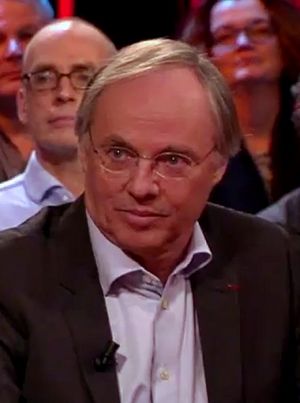Hans Clevers facts for kids
Quick facts for kids
Hans Clevers
|
|
|---|---|

Clevers in 2018
|
|
| Born |
Johannes Carolus Clevers
27 March 1957 |
| Nationality | Dutch |
| Alma mater | Utrecht University |
| Known for | Organoid generation and application |
| Spouse(s) | Eefke Petersen |
| Children | 2 |
| Awards | Louis-Jeantet Prize for Medicine Breakthrough Prize in Life Sciences Dr A. H. Heineken Prize for Medicine Körber European Science Prize |
| Scientific career | |
| Fields | Molecular genetics Cell biology |
| Institutions | Roche Princess Máxima Center University Medical Center Utrecht Hubrecht Institute for Developmental Biology and Stem Cell Research Utrecht University Dana–Farber Cancer Institute |
| Thesis | Early events in lymphocyte activation (1985) |
| Doctoral advisor | Rudy Ballieux |
Johannes (Hans) Carolus Clevers (born March 27, 1957) is a Dutch scientist. He studies molecular genetics, cell biology, and stem cells. These fields look at how our bodies work at a very tiny level.
In 2022, he became a top leader at Roche, a big healthcare company in Switzerland. Before that, he led important research groups. These groups were at the Hubrecht Institute and the Princess Máxima Center. He is also a Professor at Utrecht University.
Contents
Early Life and Education
Hans Clevers was born in Eindhoven, Netherlands, in 1957. He started studying biology at Utrecht University in 1975. Later, in 1978, he also began studying medicine. He was interested in medicine, and many of his friends and family worked in that field.
He spent time studying in other countries too. He was in Nairobi, Kenya, for a year. He also spent six months in Bethesda, United States. He earned a degree in Biology in 1982. Then, he got a medical degree in 1984. Because of his research, he chose to train in paediatrics (children's medicine). In 1985, he started working on his PhD degree. He finished his PhD just one year later.
Career Highlights
After getting his PhD, Hans Clevers worked as a postdoctoral researcher in the United States. In 1989, he came back to the Netherlands. He joined Utrecht University as an assistant professor.
In 1991, he became a full professor at the university. He led the Department of Immunology. In 2002, he moved to the University Medical Center Utrecht. There, he became a professor in molecular genetics. He also started his own lab at the Hubrecht Institute. At the same time, he became the Director of the Hubrecht Institute.
In 2012, Hans Clevers was chosen to be the president of the Royal Netherlands Academy of Arts and Sciences. After his term ended in 2015, he started a new lab. This lab was at the Princess Máxima Center. His work there focused on childhood cancer. He was the Director of Research and Chief Scientific Officer until 2019.
In 2020, Clevers became a Professor of Molecular Genetics at Utrecht University. In 2022, he joined Roche, a Swiss healthcare company. He became a top leader in their research and development team. He still advises and visits his research groups at the Princess Máxima Center and Hubrecht Institute.
Since 2017, Hans Clevers has also been a researcher at the Oncode Institute in Utrecht. He has also helped guide many important science groups. He is on the advisory board for several scientific journals. These journals publish new scientific discoveries.
Amazing Discoveries
Hans Clevers's early work looked at something called the Wnt signaling pathway. Think of this as a special communication system inside our cells. His group found a protein called TCF1. This protein is a key part of the Wnt system. It helps with our immune responses, how bodies develop, and how tissues repair themselves.
He became interested in the gastrointestinal tract (our gut). He found that another protein, TCF4, is needed to form parts of the intestine. Working with another scientist, he discovered something important about colon cancer. In colon cancer, if a gene called APC is broken, the TCF proteins can cause other changes. These changes can make cells grow in a way that leads to cancer. This showed a clear link between the Wnt system and colon cancer.
In 2007, Clevers's team found a special marker for stem cells in the small and large intestines. This marker is called LGR5. He found that LGR5 is also a stem cell marker in other body parts. These include the stomach and hair follicles.
Growing Mini-Organs
Building on this discovery, his group made a huge breakthrough in 2009. They showed how to grow organoids for the first time. Organoids are like tiny, 3D mini-organs grown in a lab dish. They act and look like real organs. His team first made mini-intestines from adult stem cells.
Since then, Clevers's group has used this method to grow organoids from other organs. These include the stomach and liver. They have also grown organoids from different types of cancer, like breast and ovarian cancer.
This amazing technology helps doctors in many ways. They can grow organoids from a patient's own cells. Then, they can test different medicines on these mini-organs. This helps find the best treatment for that specific patient. This method is used for cancer and other diseases, like cystic fibrosis. His current research focuses on using these mini-organs to understand how tissues grow and how cancer develops.
During the COVID-19 pandemic, Clevers's group used lung organoids. They used them to study how the SARS-CoV-2 virus infects the lungs.
Awards and Honors
Hans Clevers has received many important awards for his scientific work. Some of these include:
- Member of the European Molecular Biology Organization (1999)
- Spinoza Prize (2001)
- Louis-Jeantet Prize for Medicine (2004)
- Knight of the Legion of Honour (2005)
- Breakthrough Prize in Life Sciences (2013)
- Körber European Science Prize (2016)
- Foreign Member of the Royal Society (2019)
- Keio Medical Science Prize (2019)

